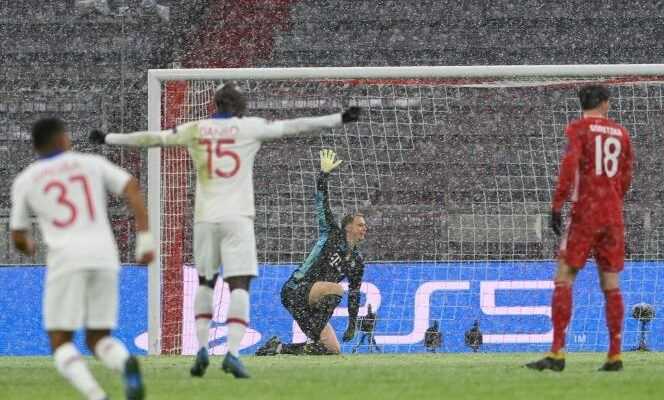MOn the evening of Wednesday April 7, the exceptional climatic episode that Europe is experiencing engulfed the Munich Arena in the form of squalls of snow and suffocating cold. While modern stadiums are almost hermetic cases and their lawns ban false rebounds, these conditions announced an exceptional match, in a setting of nature to (almost) make you forget the emptiness of the immense stands.
Admittedly, the heated lawn and the passage of nets at half-time left us nostalgic for orange balls and slides on snowy grass, but the elements gave this quarter-final first leg of the Champions League a dantesque tone. , that its progress did not deny: Bayern unleashed a storm in the PSG camp, which caused lightning to fall in the Bavarian camp.
The Parisians thus obtained a victory (3-2) that neither the forecasts nor the balance of power on the ground promised them. The numbers are giddy, but thirty-one shots do not give victory when the opponent converts three out of six. Paris held with luck, self-sacrifice, a great goalkeeper and prodigious attackers, delivering a textbook case of the opposition between collective mastery and individual efficiency.
Defy the odds
The development of statistics in football has given us a valuable indicator: the expected goals (xG). Calculated on the probabilities of scoring in the various positions and shooting conditions obtained, it provides information on the quality of the chances generated. Schematically, the expected goals express the number of goals a team could hope to score. For Bayern-PSG: 3.8 against 1.4 …
This meeting, like the Manchester City-Leeds of Saturday April 10 (score: 1-2, xG: 2.2-0.2), expressed the essence of football, a sport which very curiously defines “merit” in who is not always the strongest who scores the most goals, and whose imponderable remains the main scriptwriter when played on more or less equal terms. We invoke “realism”, while recognizing that fate very often trumps all logic. Praise be our game.
The vocation of expected goals is therefore… to be denied. At least occasionally because, over time, competitions end up confirming superiorities – unless you have attackers who are really too clumsy to convert the opportunities obtained. Last week, Bayern were without Robert Lewandowski, involved in twenty-five Champions League goals this season.
Even without the Pole, if the two teams reproduce a similar match for the return to the Parc des Princes on Tuesday, April 13, PSG may fear being punished by the odds, which cannot be provoked indefinitely. We must not, either, be mistaken about the nature of the “surprise” of the first leg, between two of the richest teams on the continent and whose winner aligned Neymar Jr and Kylian Mbappé.
Domesticate the hazard
The group stage of the Champions League indeed ensures a drastic skimming the purpose of which is to oppose, in the knockout phase, the big teams between them. It is only then and between them that sporting uncertainty is reestablished, leaving only a few outsiders the possibility of achieving unexpected routes.
That of Ajax Amsterdam in 2018-2019 was hailed as the reward for a training policy and a quality game project. But Ajax only reached the semi-finals of the Champions League once in twenty-four years and, stripped of his best elements, he did not come out of his squad for the next two seasons …
The future formula of the Champions League, whose adoption is imminent, will only strengthen the ascendancy of the European oligarchy and the principle of a competition in two stages and two speeds: a pseudo-championship whose interest is primarily financial by multiplying the number of matches; the traditional phase with direct elimination, devoted to the prestigious spectacle of the clashes between cadors.
This is why the Bayern-PSG match speaks of both the eternal magic of football and its current cynicism: the sporting hazard is now circumscribed and domesticated. UEFA will for the umpteenth time give in to the blackmail of a closed “Superleague”, whose promoters still want to tear off the management and distribution of the rights of the Champions League. To complete a football for rentiers in which, expected goals or not, the risks are as calculated as the income.
